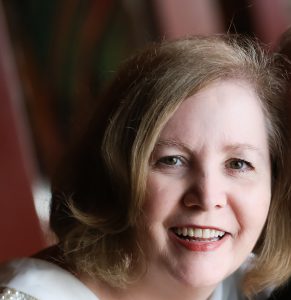Helping Make Sure Families Won’t Have to Say Goodbye Because of Cancer
Posted on byBy Reda Wilson, Lead Epidemiologist, CDC Division of Cancer Prevention and Control
Reda Wilson has worked in cancer prevention and control more than 30 years, including 18 years at the Centers for Disease Control and Prevention’s (CDC) Division of Cancer Prevention and Control. In celebration of the 30th anniversary of CDC’s National Program of Cancer Registries (NPCR), Reda tells us about her experiences building and expanding cancer registries including NPCR, and why the program is so important to her.
Reda’s Story

More than 30 years ago, a mother who had been treated for cancer ended up dying from it and left her family in financial ruin. After her death, her family told my coworkers and me that her young daughter slipped a few pennies into her mother’s casket during her funeral service. They said she wanted to make sure her mother would never be without money again. When I heard that, it broke my heart. All these years later, I still think about that family. It reminds me why I work in cancer health care, including NPCR.
This year, NPCR celebrates its 30th anniversary. As someone who has been involved in building cancer registries, including NPCR, I couldn’t be more proud of how far the program has come.
NPCR Helps Modernize Alabama’s Cancer Registry
My work in cancer health care began in 1984 while I was still living in my home state of Alabama. After working my way up through various cancer surveillance positions, I was given the opportunity to work on a special project evaluating cancer cases and outcomes in a traditionally poor, underserved region. After I began, it became clear to me that we should look at cancer not just in this region, but throughout the state of Alabama.
Alabama had a state cancer registry from the late 1950s through the late 1970s, but due to staffing shortages and data limitations, information was rarely shared with the medical community. By the late 1980s, fewer than 15 hospitals in the state had a cancer registry. We were desperate for help. In 1995, NPCR gave the state funding to modernize the Alabama State Cancer Registry (ASCR).
With help from NCPR, we had more data justifying the need for cancer prevention, early detection, and control. It was suddenly much easier to identify areas in the state where our limited resources could be focused. We were also able to establish training programs for every hospital in Alabama. We soon saw a dramatic increase in the number of Certified Tumor Registrars, hospital cancer programs, and treatment centers across the state.
During my years at ASCR, I performed cancer studies, gave presentations to communities about cancer in their area, appeared regularly on a local television program, and was even interviewed by a well-respected national news magazine. Talking about cancer isn’t always the easiest, most exciting topic, but it’s an important one. I like to think that I had a hand in educating my state about cancer and helping people protect themselves.
“A Miracle I Could Have Only Dreamed About 30 Years Ago”
After 10 years at ASCR, I joined CDC in the Division of Cancer Prevention and Control, Cancer Surveillance Branch as a program consultant. Later, I became a lead epidemiologist. For the last 18 years, I have seen NPCR’s influence in Alabama and across the country. The data we collect allows us to monitor the number of cancer cases and identify cancer prevention and care needs from the national level to the local level. It can be easy to forget, but having data readily available for every state and county is a miracle I could have only dreamed about 30 years ago. But like most things, there are always ways to improve.
Like everyone, I’ve had several family members affected by this disease, including my own daughter’s recent passing. I’m confident that some of these cancers may have been avoided if people had been given the proper prevention options. I hope that over the next 30 years, NPCR and CDC increase our cancer surveillance, expand prevention resources, and continue to push toward a future free of cancer.
As I look back on my career so far, I take pride in knowing my work has helped to create a successful national cancer surveillance system. I’m pleased when I see reports showing decreasing cancer rates and improved survival. I take comfort in knowing my family is proud of the work I do. Even during my daughter’s own cancer fight, she made sure her doctors and nurses knew what I do and the difference I help make. My ultimate hope as I continue my work at CDC is that one day, families won’t have to say goodbye to each other because of cancer.
To learn more about NPCR, please visit: https://www.cdc.gov/cancer/npcr/index.htm
3 comments on “Helping Make Sure Families Won’t Have to Say Goodbye Because of Cancer”
Comments listed below are posted by individuals not associated with CDC, unless otherwise stated. These comments do not represent the official views of CDC, and CDC does not guarantee that any information posted by individuals on this site is correct, and disclaims any liability for any loss or damage resulting from reliance on any such information. Read more about our comment policy ».
Thank you CDC-NPCR for all of your important work and a special thanks to Reda for her dedication and hard work.
Reda, I am thankful for your work and the efforts of so many other people fighting cancer. Your information helps us understand the progress that has been made in this area.
Reda, as we have been friends since third grade, I have known of your outstanding work. I very proud of all the knowledge that you have learned throughout the years. You are a blessing to all who have known and learned from you!